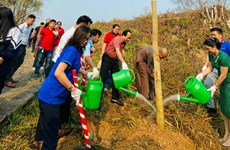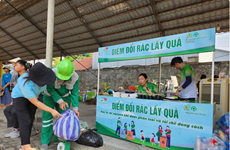UNICEF helps Ninh Thuan mitigate disaster risks
A conference was held in Ninh Thuan on March 22, focusing on measures to enhance cooperation between the locality and the UNICEF in fighting and adapting to natural disasters targeting children.
 The consultation conference in Ninh Thuan province on March 22 (Photo: VNA)
The consultation conference in Ninh Thuan province on March 22 (Photo: VNA)Ninh Thuan (VNA) – A consultation conference was held in the central province of Ninh Thuan on March 22, focusing on measures to enhance cooperation between the locality and the UN Children’s Fund (UNICEF) in fighting and adapting to natural disasters targeting children.
As part of the project on child-centred disaster risk reduction, the event was joined by Vietnamese experts, those from UNICEF and other international organisations.
Participants reviewed the implementation of the project and share experience in deploying emergency relief programmes in areas hit by drought and saline intrusion, and mitigating natural disasters.
They agreed to build the child-centred disaster risk mitigation programme in 2017-2021, focusing on building a better coordination mechanism among involved parties to reduce natural disasters’ effects on children, and improve the capacity of relevant agencies, children and families and social organisations in the work.
Vice Chief Representative of UNICEF in Vietnam Jesper Moller said the programme will help promote cooperation among parties in the disaster adaptation scheme, towards creating positive changes in protecting, caring and educating children.
He affirmed that UNICEF will continue working with Ninh Thuan to help the province address difficulties caused by climate change and mitigate disaster risks in the coming time.
Praising efforts made by UNICEF in recent time, Vice Chairman of the provincial People’s Committee Le Van Binh pledged to promote programmes including children-related issues in the province’s development plans, and support the child education.
Ninh Thuan has been one of localities hardest hit by climate change, which caused prolonged drought and saline intrusion.
The prolonged drought from 2015 to the end of 2016 in Ninh Thuan pushed about 54,000 locals to shortage of food and water. A total of 1,050 children suffered from severe acute malnutrition, while 11,000 others aged between 6 to 23 months old were deficient in micronutrients.
UNICEF has deployed many activities to help the locality deal with the situation, including providing clean water and multi-micronutrient products and treating severe acute malnutrition for women and children who are the most vulnerable to climate change.-VNA













